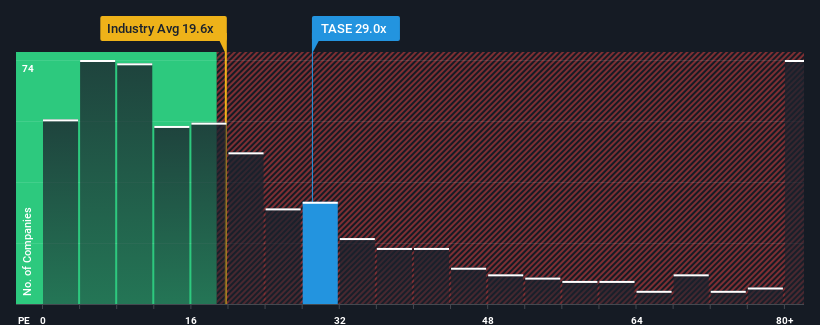- Israel
- /
- Capital Markets
- /
- TASE:TASE
Investors Interested In The Tel-Aviv Stock Exchange Ltd.'s (TLV:TASE) Earnings
The Tel-Aviv Stock Exchange Ltd.'s (TLV:TASE) price-to-earnings (or "P/E") ratio of 29x might make it look like a strong sell right now compared to the market in Israel, where around half of the companies have P/E ratios below 11x and even P/E's below 7x are quite common. Nonetheless, we'd need to dig a little deeper to determine if there is a rational basis for the highly elevated P/E.
With earnings growth that's exceedingly strong of late, Tel-Aviv Stock Exchange has been doing very well. It seems that many are expecting the strong earnings performance to beat most other companies over the coming period, which has increased investors’ willingness to pay up for the stock. If not, then existing shareholders might be a little nervous about the viability of the share price.
Check out our latest analysis for Tel-Aviv Stock Exchange

How Is Tel-Aviv Stock Exchange's Growth Trending?
Tel-Aviv Stock Exchange's P/E ratio would be typical for a company that's expected to deliver very strong growth, and importantly, perform much better than the market.
Taking a look back first, we see that the company grew earnings per share by an impressive 52% last year. The strong recent performance means it was also able to grow EPS by 188% in total over the last three years. Therefore, it's fair to say the earnings growth recently has been superb for the company.
Weighing that recent medium-term earnings trajectory against the broader market's one-year forecast for expansion of 23% shows it's noticeably more attractive on an annualised basis.
In light of this, it's understandable that Tel-Aviv Stock Exchange's P/E sits above the majority of other companies. Presumably shareholders aren't keen to offload something they believe will continue to outmanoeuvre the bourse.
What We Can Learn From Tel-Aviv Stock Exchange's P/E?
We'd say the price-to-earnings ratio's power isn't primarily as a valuation instrument but rather to gauge current investor sentiment and future expectations.
As we suspected, our examination of Tel-Aviv Stock Exchange revealed its three-year earnings trends are contributing to its high P/E, given they look better than current market expectations. At this stage investors feel the potential for a deterioration in earnings isn't great enough to justify a lower P/E ratio. Unless the recent medium-term conditions change, they will continue to provide strong support to the share price.
It is also worth noting that we have found 1 warning sign for Tel-Aviv Stock Exchange that you need to take into consideration.
If you're unsure about the strength of Tel-Aviv Stock Exchange's business, why not explore our interactive list of stocks with solid business fundamentals for some other companies you may have missed.
Valuation is complex, but we're here to simplify it.
Discover if Tel-Aviv Stock Exchange might be undervalued or overvalued with our detailed analysis, featuring fair value estimates, potential risks, dividends, insider trades, and its financial condition.
Access Free AnalysisHave feedback on this article? Concerned about the content? Get in touch with us directly. Alternatively, email editorial-team (at) simplywallst.com.
This article by Simply Wall St is general in nature. We provide commentary based on historical data and analyst forecasts only using an unbiased methodology and our articles are not intended to be financial advice. It does not constitute a recommendation to buy or sell any stock, and does not take account of your objectives, or your financial situation. We aim to bring you long-term focused analysis driven by fundamental data. Note that our analysis may not factor in the latest price-sensitive company announcements or qualitative material. Simply Wall St has no position in any stocks mentioned.
About TASE:TASE
Outstanding track record with excellent balance sheet.
Similar Companies
Market Insights
Community Narratives




